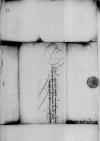Denn ersamenn unnd namhafftigenn hernn ⌊burgermeister unnd rathmann der koniglichen stadt Dantzig⌋, unsern bsundren, gutten freunden
Unnserenn freuntlichenn grus unnd alles gutts zuvoran. / Ersame, namhafftige herrenn, besundere, gutte freunde. /
Wir habenn Ewer Erbarkeit ⌊⌋, / den letzten thag Iulii vorschienen zu ⌊Danntzigk⌋ datirt, erhaltenn, / daraus zu dancke gerne vornomenn / des armenn menschenn bekantnus, / damit wir uns auch vor solchenn bosenn leuthenn mit denn unserenn mugen wissenn zu huttenn. / Es nimpt unns aber nicht wenig wunder, / das auff den fromen hertzogk, / der unns fast wol bekant ist, / dergleichen unchristliche that gezogenn / unnd bekantnusse ausgehenn, / weil er mit ⌊Dantzigk⌋, ⌊Elbingk⌋ oder ⌊Konigsberg⌋ / unnd hie mit ⌊diessem lannde⌋ inn keinem wiedderwillenn gestandenn. / Unnserem beduncken nach / mus diesse sache vil ein andere gestalt habenn, / die etwan mit der zeit der warheitt gemess / wirt ausbrechenn. Solche ansthifftunge, kome danne von weme sie auch wil, / so ist dannoch gutt und vleissig aufsehenn zuhabenn, / das dermassenn besem vornhemenn zuvor muge gekomenn werden / etc.
Unns wirt angezeigt, / wie das ampt des baums am schlosse bey Ewer Erbarkeit loss sey wordenn, / darauff uns zu gedechtnus gefallenn, / wie wir etlich mal vor unseren vorwantenn ⌊Heinrich Hoffmann⌋ gebethenn, / auch von Ewer Erbarkeit nicht ungewisse vortröstung derhalbenn gehabt, / wann dergleichenn etwas frey wurde, / das er unvorgessenn sold bleibenn, derwegenn wir aber malhs freuntlich bitten mit gemeltem ampt uns wolten wilfarenn. / Wo mit wir widerumb Ewer Erbarkeit, / die wir gottlichenn gnaden befelhenn, / vyl wolgefallens erzeigenn muegen, sein wir erbottig.

